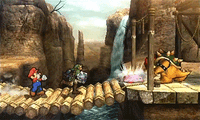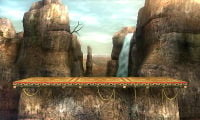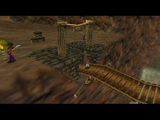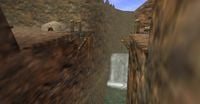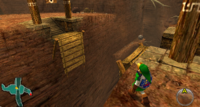Gerudo Valley: Difference between revisions
(cleanup (giving an Origin section to Kotake and Koume right now)) |
|||
| Line 18: | Line 18: | ||
|interwikipage= Gerudo Valley | |interwikipage= Gerudo Valley | ||
}} | }} | ||
'''Gerudo Valley'''<ref>[https://miiverse.nintendo.net/posts/AYMHAAABAABnUYnWPtw3lA Sakurai's post on Miiverse]</ref> ({{ja|ゲルドの谷}}, ''Gerudo Valley'') is a [[stage]] in {{for3ds}} | '''Gerudo Valley'''<ref>[https://miiverse.nintendo.net/posts/AYMHAAABAABnUYnWPtw3lA Sakurai's post on Miiverse]</ref> ({{ja|ゲルドの谷}}, ''Gerudo Valley'') is a [[stage]] in {{for3ds}}. It is one of two stages from the {{uv|Zelda}} universe in {{for3ds}}, alongside [[Spirit Train]]. This is where {{SSB4|Ganondorf}} is unlocked. | ||
==Layout== | ==Layout== | ||
[[File:Gerudo Valley Fight.gif|thumb|left|Battle in the Gerudo Valley stage.]] | [[File:Gerudo Valley Fight.gif|thumb|left|Battle in the Gerudo Valley stage.]] | ||
The Gerudo Valley stage is fairly long, being a mostly flat, grounded stage. The stone and natural flooring serve as solid platforms, and a bridge crosses the chasm between the two stretches of land. Two canopies stand on each piece of land, providing soft [[platform]]s for characters to stand on. | The Gerudo Valley stage is fairly long, being a mostly flat, grounded stage. The stone and natural flooring serve as solid platforms, and a bridge crosses the chasm between the two stretches of land. Two canopies stand on each piece of land, providing soft [[platform]]s featuring the [[:zeldawiki:Gerudo Symbol|Gerudo symbol]] for characters to stand on. A desert wind will blow across the stage, for aesthetic effect. | ||
The central bridge can be destroyed by attacking it, similarly to the floor of [[Green Hill Zone]] | The central bridge can be destroyed by attacking it, similarly to the floor of [[Green Hill Zone]]: this allows access to the chasm below, and makes the bottom [[blast line]] moves downwards to compensate. Two small platforms, which can also be broken by attacks, protrude from each side of the chasm, as well as some damaging {{b|spike|stage element}}s. | ||
[[Koume and Kotake]] | Soon after the bridge is broken, [[Koume and Kotake]] fly down laughing, and one of them casts a spell which alters one half of the stage: Kotake's spell hits the left side of the stage covering it in damaging flames, while Koume's spell hits the right side making [[freeze|freezing]] ice spikes appear. | ||
After a while, the "Song of Time" will be heard and the bridge will repair itself: this returns the blast line back to its default position, [[KO]]'ing any fighters who do not return to the surface quickly enough. In earlier versions of the game the blast line moved rather abruptly, KO'ing fighters almost instantly as a result: this has been changed in [[List of updates (SSB4-3DS)#1.0.5|Version 1.0.5]], and players are now given much more time to recover before the camera returns to the default position. | |||
==Ω Form== | ==Ω Form== | ||
In Omega mode, the stage has the | In Omega mode, the stage has the Gerudo symbol as a floor design. Walk-off blast lines are removed and Koume and Kotake do not appear. | ||
<gallery widths="200px"> | <gallery widths="200px"> | ||
Gerudo Valley Omega.jpg|[[Final Destination (SSB4)|Ω Mode]] | Gerudo Valley Omega.jpg|[[Final Destination (SSB4)|Ω Mode]] | ||
| Line 35: | Line 37: | ||
==Origin== | ==Origin== | ||
Gerudo Valley | Gerudo Valley originates from ''{{s|zeldawiki|The Legend of Zelda: Ocarina of Time}}'': it is a long, deserted valley which acts as the gateway to the domain of the {{s|zeldawiki|Gerudo}}, and [[Link]] has to traverse it in order to reach {{s|zeldawiki|Gerudo's Fortress}} and the {{s|zeldawiki|Haunted Wasteland}}. The visual design of the stage is more similar to the one of the [[Nintendo 3DS]] remake ''{{s|zeldawiki|The Legend of Zelda: Ocarina of Time 3D}}''. | ||
In | In the original game, the {{s|zeldawiki|Gerudos}} decided to destroy the bridge over {{s|zeldawiki|Zora's River}} to prevent intruders from entering their land. Carpenters then set up a camp nearby and attempted to repair it, however they were captured by the Gerudos and held captive their fortress. After [[Link]] infiltrates the fortress and rescues them all, the bridge is finally repaired. | ||
[[zeldawiki: | The [[zeldawiki:Gerudo Symbol|symbol]] on the platforms represents the Gerudo tribe. In the original ''Ocarina of Time'' it was different, featuring a star and crescent, but it was replaced with the current version in all subsequent games (including ports and remakes of ''Ocarina'') due to its resemblance to the [[:wikipedia:Star and crescent|Islamic star and crescent]]. | ||
:''See also: [[Kotake and Koume#Origin|Kotake and Koume]].'' | |||
<gallery> | <gallery widths="200px"> | ||
File:Gerudo Valley | File:Gerudo Valley Bridge.png|The intact bridge in Gerudo Valley, from ''Ocarina of Time''. | ||
File:Gerudo Valley | File:Gerudo Valley Original.jpg|Gerudo Valley with the bridge destroyed in ''Ocarina of Time''. | ||
File:Gerudo Valley 3D.png|Gerudo Valley in ''Ocarina of Time 3D'' | File:Gerudo Valley 3D.png|Gerudo Valley with the bridge destroyed in ''Ocarina of Time 3D''. | ||
</gallery> | </gallery> | ||
Revision as of 07:02, May 28, 2016
| Gerudo Valley | |
|---|---|
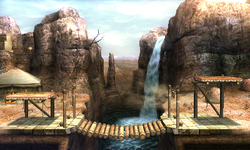 
| |
| Universe | The Legend of Zelda |
| Appears in | SSB4 (3DS) |
| Availability | Starter |
| Crate type | Normal |
| Tracks available | Gerudo Valley Ocarina of Time Medley (Alternate) |
| Article on Zelda Wiki | Gerudo Valley |
Gerudo Valley[1] (ゲルドの谷, Gerudo Valley) is a stage in Super Smash Bros. for Nintendo 3DS. It is one of two stages from the Zelda universe in Super Smash Bros. for Nintendo 3DS, alongside Spirit Train. This is where Ganondorf is unlocked.
Layout
The Gerudo Valley stage is fairly long, being a mostly flat, grounded stage. The stone and natural flooring serve as solid platforms, and a bridge crosses the chasm between the two stretches of land. Two canopies stand on each piece of land, providing soft platforms featuring the Gerudo symbol for characters to stand on. A desert wind will blow across the stage, for aesthetic effect.
The central bridge can be destroyed by attacking it, similarly to the floor of Green Hill Zone: this allows access to the chasm below, and makes the bottom blast line moves downwards to compensate. Two small platforms, which can also be broken by attacks, protrude from each side of the chasm, as well as some damaging spikes.
Soon after the bridge is broken, Koume and Kotake fly down laughing, and one of them casts a spell which alters one half of the stage: Kotake's spell hits the left side of the stage covering it in damaging flames, while Koume's spell hits the right side making freezing ice spikes appear.
After a while, the "Song of Time" will be heard and the bridge will repair itself: this returns the blast line back to its default position, KO'ing any fighters who do not return to the surface quickly enough. In earlier versions of the game the blast line moved rather abruptly, KO'ing fighters almost instantly as a result: this has been changed in Version 1.0.5, and players are now given much more time to recover before the camera returns to the default position.
Ω Form
In Omega mode, the stage has the Gerudo symbol as a floor design. Walk-off blast lines are removed and Koume and Kotake do not appear.
Origin
Gerudo Valley originates from The Legend of Zelda: Ocarina of Time: it is a long, deserted valley which acts as the gateway to the domain of the Gerudo, and Link has to traverse it in order to reach Gerudo's Fortress and the Haunted Wasteland. The visual design of the stage is more similar to the one of the Nintendo 3DS remake The Legend of Zelda: Ocarina of Time 3D.
In the original game, the Gerudos decided to destroy the bridge over Zora's River to prevent intruders from entering their land. Carpenters then set up a camp nearby and attempted to repair it, however they were captured by the Gerudos and held captive their fortress. After Link infiltrates the fortress and rescues them all, the bridge is finally repaired.
The symbol on the platforms represents the Gerudo tribe. In the original Ocarina of Time it was different, featuring a star and crescent, but it was replaced with the current version in all subsequent games (including ports and remakes of Ocarina) due to its resemblance to the Islamic star and crescent.
- See also: Kotake and Koume.
Gallery
A clearer view of the lower part of the stage, with spikes visible.
References
